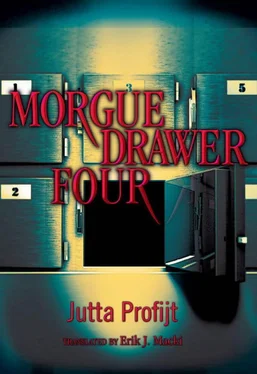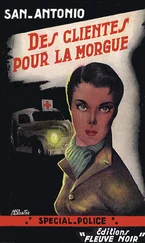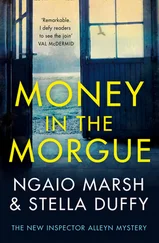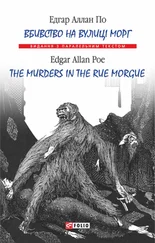“You told the police that you recognized the woman from the photo in the paper,” Martin started.
“ Da, da, I tolt police everything.”
The accent she spoke with was bad enough, but the fact that she had only a few teeth in her mouth all sticking out crooked from her lower jaw didn’t improve things. I didn’t want to try to imagine what Martin’s computer might write if she were dictating to it.
“It would be great if you could repeat it for me,” Martin said.
“Girl lived here, above me,” she said.
“Do you know her name?”
She shook her head. “No name on door, never tolt me.”
“Did you ever speak with her then?” Martin asked.
She nodded. “Hello and such.”
“Did she speak German?”
“Yes, but mother tonkue from Balkan or such.”
“Did she live alone?”
“ Da, da, alone. But man sometimes was there.”
The toothless grandma winked at Martin! I roared with laughter, but Martin winced so big that you see it even through his duffle coat.
“What kind of man?” Martin asked after pausing to recover, during which he attempted, and totally failed at, a friendly smile.
“Tall.” She held up her arms in a gesture that meant more “fat” than “tall.”
“Bik man with nice car,” she added.
Our ears pricked up. “A small, silver, fast car?” I suggested, like the SLR, and Martin repeated the question for the grandma.
“Not small. Bik man, bik car.”
Ah ha, too bad. But actually that made sense. Fat men drive fat cars.
“Did she spend a lot of time at home, or did she have a job?” Martin asked.
“In day at home, in night away.”
“Maybe she served tables at a restaurant?” Martin suggested.
The grandma energetically shook her head, and then made a gesture that is understood internationally. Martin turned beet-red. The grandma grinned again and set her hand on his arm. Martin stared.
She let go of his arm. “Not on street.” For the next gesture, she rubbed her thumb and index finger together.
Ah ha. She meant that the dead woman hadn’t been some cheap streetwalker. But could a centenarian like this tell that? A woman who was running a shelf-life experiment in her fridge with sardines marinated in newsprint?
I answered the question for myself with a resounding yes. The woman was not stupid; she just had a strange view of modern residential environments, hygiene, and food preparation. But she had life experience, and that’s what we needed here. I took her at her word.
The only thing that was still bugging me now was the question of why this woman, who so obviously lived in her own world, had contacted the police. It certainly may be a prejudice on my part, but I have never before had the impression that those of our fellow countrymen and women with a westward-oriented immigration background had any particular fondness for German law enforcement. You get what I mean, right? That Russians piss on German cops wherever and whenever they can. Martin evidently had the same idea, but articulated it in a higher linguistic register.
“Ask her,” I said.
“She might interpret that as an insult,” he said.
“So what?” I said. “That’s actually what we want to know.”
Martin asked. Worded nicely. So nicely that at first Ekaterina didn’t at all understand what Martin wanted from her. Then the penny dropped.
“Where I am comink from, you can buy police like woman. Here, police goot.”
Sometimes it’s as simple as that. Now, in my short life I used to screw the cops over whenever I could, and here this antique matron loved the German police for their white vests, and so she performed her civic duty with great attentiveness. I was embarrassed. Secretly, of course, so Martin wouldn’t notice.
We left the apartment, the building, and that neighborhood, and I asked Martin what we wanted to do with the rest of our evening now.
“I’m dropping you off at the Institute,” he said. “Then I’ve got something else planned.”
Birgit! I could feel it, even though he was exerting his maximum effort to withhold these thoughts from me. “OK,” I said.
We drove to the Institute, Martin came in with me, turned the TV on in Conference Room Two, went down to the autopsy section, scrubbed his hands with hot water and disinfectant, and then called “see you tomorrow” and disappeared.
Of course I did not stay at the Institute. Late-night programming isn’t so great that I want to hang out in front of it all night if I’ve got an alternative. And this alternative was very interesting indeed.
Previously I hadn’t had much opportunity to study Birgit and Martin’s relationship very closely. The relationship did seem to be pretty new, generally. So quite a bit could still happen. I kept my thoughts strictly to myself so Martin wouldn’t notice I was there, and I drove with him to Birgit’s place.
She had obviously been waiting for him.
When she opened the door, her blond hair was illuminated by the lamp in her foyer, giving her an authentic halo, like in those little pictures of saints from religion class at school.
The rest was not saint-suitable. Her pinstriped pants, which I was already familiar with, were pretty frigging tight, and the white sweater she was wearing today fit her grille like such a soft coat of fur that you immediately wanted to pet it. It’s the same compulsion that overcomes every kid at the petting zoo. “A bunny rabbit, Mommy, a bunny rabbit!” and, presto, sticky kids’ hands are running over the furry curves. Martin’s hands restrained themselves effortlessly, however. I didn’t trust myself to peek into Martin’s brain because he wasn’t supposed to notice that the evening was going to be a threesome.
“Are you hungry?” Birgit asked. “I can make you something to eat.”
“No, thanks,” Martin muttered. “I grabbed something on the way over at Wedschi-Pärädeis.”
Wait a second, I thought. Did I miss something? I ran back through the events of the evening, and then I realized: “Veggie Paradise” must have been the name of that street food stand where you can get anything except for a proper bite to eat. Namely, something made of meat. Burgers, currywurst, schnitzel, half a roasted chicken with fries: that’s a proper German snack. But at the stand where Martin went there were only veggies. That has nothing to do with paradise. It should be called Herbaceous Hell. Or Parsnip Purgatory. But Birgit nodded and lead the way into the living room.
First the most important thing: there were no city maps hanging on the walls here. Also no kitschy pictures of horses with long eyelashes and wavy manes, no backlit skyline pictures, and no clowns. Hanging on the walls of Birgit’s living room were vacation photos. Hundreds of them. Some with Birgit, some not. Some of big cities—I recognized Paris right away—some of landscapes that looked mainly green. Maybe Ireland? No idea.
Martin had apparently not been here yet because he went over to the walls and studied the photos while Birgit opened a bottle of white wine, filled two glasses, and brought them over to Martin.
“Cheers,” she said, beaming at him.
“ ¡Salud! ” Martin said, beaming back at her. Beaming through his eyes and his purple cheekbone.
They drank the way people drink wine. Sip by sip. Not like with beer, chugging the first can and yanking the second one open while you release the excess pressure produced in your system from the first. Nope, quite civilized here. When they set down the glasses, a disinterested observer might not have recognized that something was missing.
Martin had her explain the vacation pictures to him; it was Paris, and it was Ireland, and each picture had a little story to it. They laughed, sipped a bit of wine now and again, and the cautious touches grew more frequent. Sometimes they’d both point to the same picture and their hands would touch—gasp! Sometimes Martin would step ahead to the next picture while Birgit stayed put—body check, whoopsie!
Читать дальше












